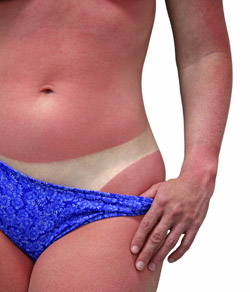 Sunburn,
especially in childhood, is associated with a higher risk of skin cancers
(basal cell carcinoma, melanoma and squamous cell carcinoma). Sunburn,
especially in childhood, is associated with a higher risk of skin cancers
(basal cell carcinoma, melanoma and squamous cell carcinoma).
We should therefore all try not to get burnt in the sun and to be aware of the damage
it can do to our skin. But some people need to be particularly careful.
Individuals should be particularly careful about going out in the sun if
they are:
- Fair skinned or red head
- Have lots of moles
- Had a history of previous sunburn
- Receiving chemotherapy
- Have a close relative with skin cancer (melanoma)
On the other hand, regular sensible sun exposure is highly beneficial. 80%
of our Vitamin D is formed in the skin during sun exposure. Vitamin D is
essential for strong bones. It is an important anticancer agent. Clinical
studies have shown that individuals who have regular sun exposure have a
lower risk of bowel breast and prostate cancer.
|
Tip to avoid sun damage
after cancer therapies
|
|
What to avoid:
|
|
|
Generally
|
Be sensible in the sun
|
|
Try not to get burnt
|
|
Do not sit in the sun when it is
hottest - during noon and 3pm
|
|
Do not be temped to use sun-beds.
|
|
Stop smoking altogether Ė if you
canít donít smoke whilst in the sun. The chemicals and carcinogens in
the smoke greatly enhance the dangerous effects of sunlight.
|
|
During and after chemotherapy
|
During and shortly after
chemotherapy the skin can be more sensitive to the sun.
All chemotherapy drugs can photosensitise the skin but particularly
florouracil types drugs for bowel and breast cancer. (Sensitivity to
chemotherapy agents usually wears off after three months)
|
|
During and after radiotherapy
|
Be very careful with skin exposed
to radiotherapy - Radiotherapy although better with modern techniques can
damage the skin but only in the area specifically treated. This may be
bigger than you think. For example, with breast cancer the upper cleavage
area would have received a dose and this can have a high exposure to sun
when wearing a v-shaped top. Unlike
chemotherapy, this sensitivity will be life long.
|
|
What to do more of:
|
|
|
|
Cover up with a hat, long sleeved
shirt and trousers if you are out in the sun when it is hottest.
|
|
Wear a high factor sun screen and
definitely a barrier cream on irradiated tissue
|
|
Gentle sun exposure late in the
afternoon
|
|
After sun exposure liberally apply
olive oil to all exposed areas for 10 minutes before taking a shower Ė
watch you donít slip!
|
|
|
|